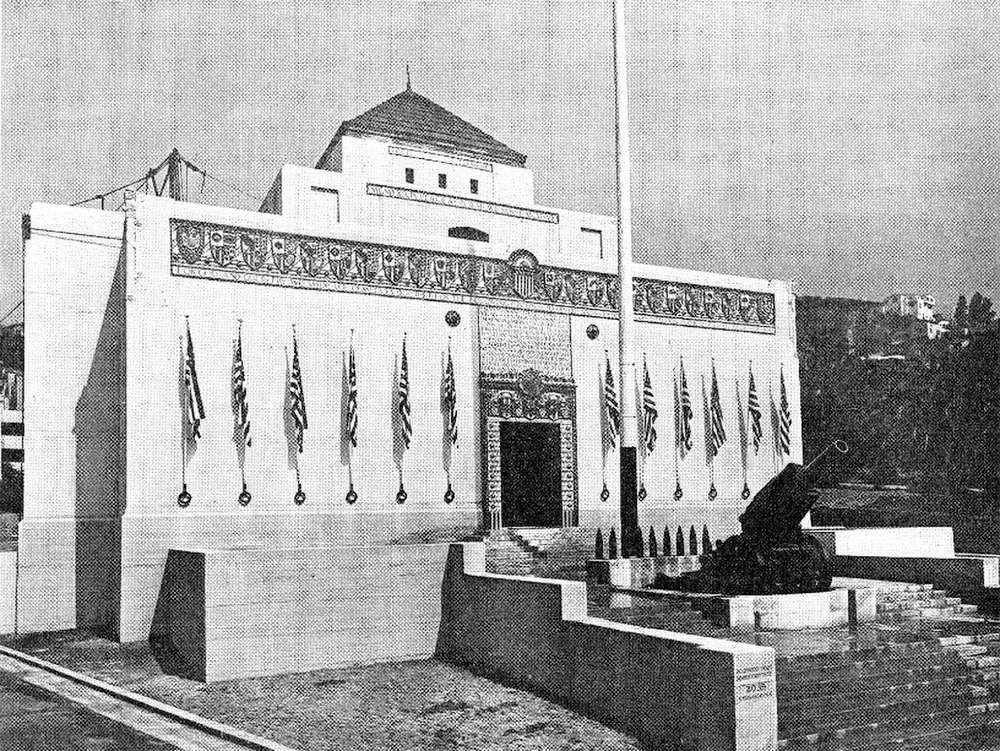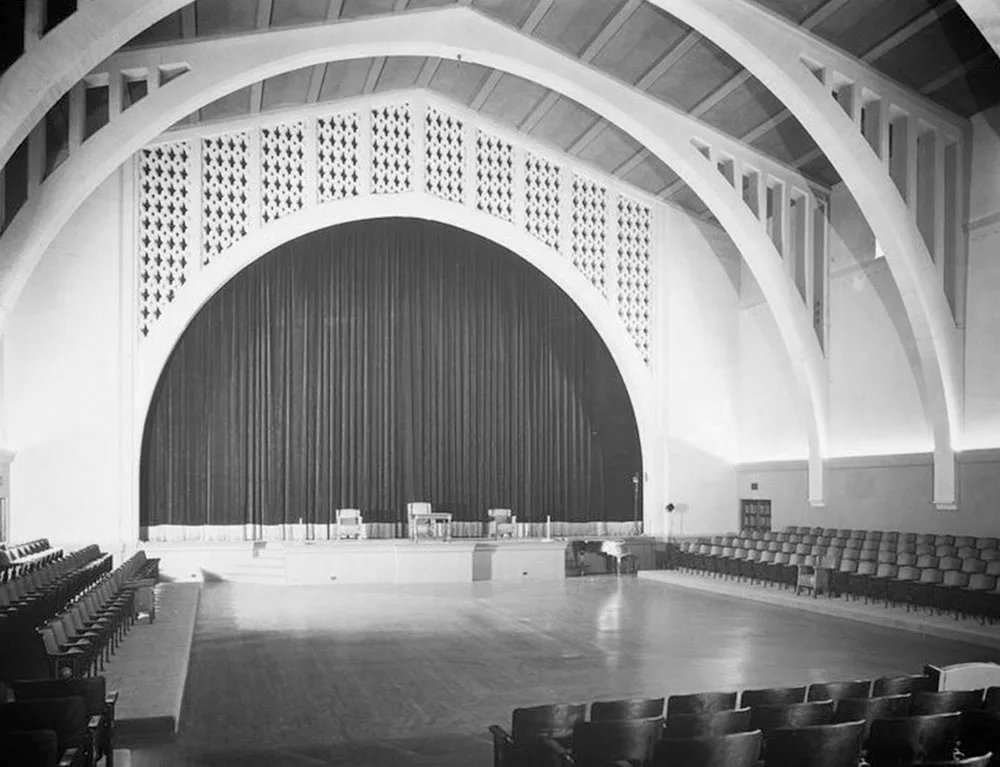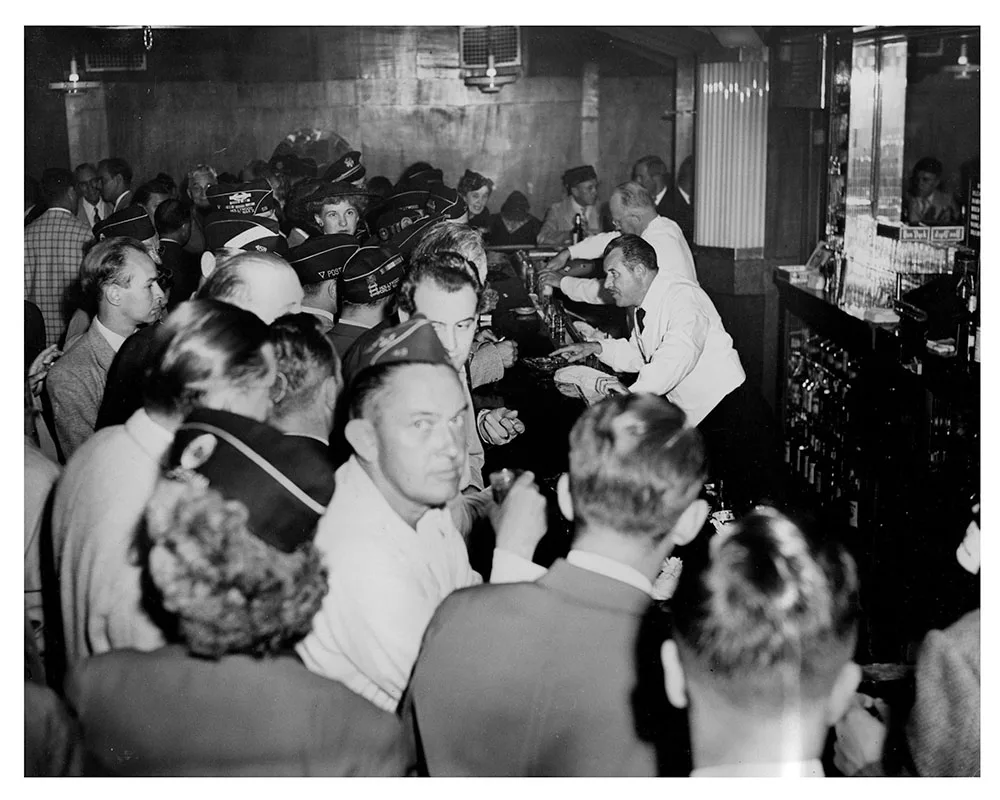This year, the head of American Legion Post 43, the nearly century-old private club for military veterans in Hollywood, faced a secret probe into his alleged misconduct. An employee at the organization’s theater, which is rented out for events, had accused him of putting his arm around her neck at the end of a night working a Bill Burr comedy show there and repeatedly attempting to kiss her while she said “no.”
Post 43’s commander, Jeff Daly, the first African American man to be elected to the top position, denied the claim. He also contended, to the outside law firm that the nonprofit club’s executive committee had hired to run the investigation, that it had been fabricated by a conspiracy of theater staffers because he’d suggested cost-cutting measures that would impact their work status. Not just that, but they were operating in cahoots with a rival club leadership faction who, he asserted, wanted to undermine him ahead of his reelection vote.
While the inquiry didn’t side with him — finding, according to The Hollywood Reporter’s review of its documentation, that the employee’s statements were “highly credible and extensively corroborated,” whereas Daly’s own were “less credible” — the episode pulls back the curtain on dynamics that have lately left in doubt the future of Post 43’s heralded theater, which emerged as one of L.A.’s buzziest venues for studio premieres and screenings following a $6 million renovation completed in 2018.
The misconduct allegations and Daly’s retort are part of a fierce larger battle among Post 43 members that pits a group that has long strongly supported the endeavor against critics who believe its renovation and operation have been plagued by financial blunders and other questionable decisions. The state-of-the-art theater, once a source of immense collective pride, is now a poisonous wedge.

Post 43 opened on July 4, 1929.
Courtesy of American Legion

The theater auditorium in 1929.
Courtesy of American Legion
The Hollywood Legion Theater, recipient of a prestigious 2023 Kodak Film Award in recognition of its exhibition standards and patron services that “elevate the cultural and communal experience of cinema,” has seen a halt in its programming and rentals, furthered by the actors and writers strikes’ impact on project rollouts. In conjunction, there has been a staff exodus, culminating in IATSE Local 33, the projectionists’ union, staging a Sept. 14 picket of the venue in a contract dispute.
THR spoke to more than a dozen high-level Legionnaires for their insights into the quagmire, including four former Post 43 commanders. Members of the current executive committee declined to be interviewed. Through legal and crisis publicity reps, the committee members responded to written questions and issued a statement in which they said they were “working hard to right the ship,” a task it described as difficult “due to years of mismanagement by former leaders who appear to us to have chosen to serve themselves at the expense of those who served their country honorably,” adding, “We strongly believe that recent leadership let our veterans down and besmirched their sacrifices through their unconscionable running of the Post for their own personal gain.” Asked for specifics, the group now in power declined to elaborate but shared records that show recent efforts by their allies to pursue an internal audit and alert state legal authorities over their financial concerns.
Former leaders who backed the theater project reject the charge as a baseless smoke screen for the new regime’s governance problems. “I thoroughly welcome criticism and accountability of leadership, and since this accusation is being made by individuals who currently hold access to all information regarding Post 43 operations past and present, I would expect factual data to be presented instead of rumor and accusation,” says Simone Lara, who held an executive committee seat until losing a reelection vote in May. Michael Hjelmstad, a former Post 43 commander and executive committee member who resigned in indignation in September, says that the insinuation of corruption “is deeply insulting to every last one of us, each of whom served our country honorably and made personal sacrifices to ensure that the best interests of Post 43 were protected during the time we served that organization.”
This is not a narrative those most closely involved with the theater expected to see play out. “It’s a tragedy, on many levels, for the Legion as well as the public,” says Scott DuVall, a staff projectionist who resigned on the day of the union picket. “The biggest tragedy is the loss won’t even be felt as profoundly as it should be because the theater wasn’t allowed to achieve all it could.”

The theater following its $6 million, state-of-the-art renovation in 2018.
Courtesy of Taiyo Watanabe
***
Like innumerable VFW halls, Masonic temples and Elks lodges, Post 43 has undergone periods of obsolescence and renewal. Founded by World War I veterans working in motion pictures during the silent era, its members have included everyone from Gene Autry, Clark Gable, Charlton Heston and Mickey Rooney to future president Ronald Reagan. In more recent decades, following the end of the U.S. draft and the transition to an all-volunteer military, Post 43’s membership, now hovering above 1,300 people, has continued to draw active-duty service members and veterans who have received an honorable discharge from across the industry — pursuing careers as performers, directors, producers, writers, executives and assorted crew including, of course, weapons consultants and pyrotechnics experts. Annual dues of $35 provide access to easy camaraderie over billiards and a range of community volunteering opportunities as well as needed guidance, or even just understanding ears, amid the often difficult transition to civilian life.
A decade ago, a coterie of primarily younger, new-guard members — led by Fernando Rivero, an Afghanistan vet turned Post commander who has cut trailers for FX and served as a technical adviser for the U.S. Navy on shows like JAG and NCIS — decided to push for the reinvention of its iconic 1929 Egyptian revival-style, 6,000-square-foot auditorium. It had been mostly mothballed except for periodic interest from location scouts and assorted event planners. The big idea was to turn the space along Highland Avenue just south of the Hollywood Bowl into a high-end cinema that could attract A-list corporate clients and serve as a revenue driver and marketing boon for Post 43.
By outward measures, the ambitious project proved a success. Beyond the plush aesthetic rehabilitation of the theater, its top-line digital as well as film capabilities (16mm, 35mm and 70mm prints can be shown) made the 482-seat venue popular not just for awards season consultants but film festival programmers. “People walk in expecting a pull-down screen and speakers on stands — and their jaws drop,” says Taylor Umphenour, the Legion’s former chief projectionist.

The building’s neon sign on Highland Avenue.
Barry King/Alamy Live News
It wasn’t long after the theater’s opening in 2019 that Sony came calling for a cast-and-crew screening of Once Upon a Time in Hollywood. Last year, Warner Bros. saw fit to show Elvis there, followed by a panel with Baz Luhrmann and Austin Butler. The biggest win, though, was Turner Classic Movies’ decision on three occasions to hold its annual film festival at the Legion theater. “When I saw a fresh [70mm] print of The Sound of Music in there, it was a religious experience,” says Rivero, who’s since left Post 43 and now lives in Texas, where he works as an executive for Taylor Sheridan’s production company. “Even if I’ve been frustrated and saddened since, that theater is the thing I’m most proud of, of anything I’ve done professionally in this business.”
The venture, though, which was financed through a loan, came at a steep cost, in literal and figurative terms. By the estimation of member Bill Steele — another Afghanistan vet, he knew Rivero from their service in the Naval Reserve and went on to be the founding theater director after being brought onboard to project-manage — “it went double over-budget,” topping out at nearly $6 million and putting Post 43 more than $4 million in debt. As in many such rehab projects, some issues requiring costly outlays were discovered only after work began, from electrical to acoustical. “Then we fell victim to scope creep,” Steele acknowledges, pointing to how the renovation of adjoining rooms soon became part of the project. (The glitzed-up Art Deco Bar was the site of the alleged incident involving Daly and the employee.) “We upgraded those spaces because we wanted to run world-class events, and the rest of the building had to be up to par for that. Some members got angry.” Steele notes that the theater “has had audits up the wazoo,” adding: “All I know is that the Post got a heck of a deal because anyone who looks at the quality of the renovations will be surprised we spent what we did. We also borrowed money at historically low interest rates.” The club itself is in no existential financial danger; it’s lately considered selling off a Hollywood commercial property it first operated as a boxing venue and now rents out to a gym for as much as $40 million.

IATSE, which represents projectionists, picketed the theater for failing to meet union demands.
Courtesy of Eric Sanchez
***
This theater-derived debt, as well as the venue’s staffing requirements, have become a key political issue in Post 43’s annual election cycles for top leadership roles. It drives rhetoric and serves as a Rorschach test. Some members see in their cinema a gem of opportunity and esteem; others, a sign of mission drift.
A central point of contention is the establishment of a subsidiary financial and governance structure for the theater, a common arrangement when a business’ gains benefit an associated nonprofit. Advocates reason dividing the theater from the Legion provides tax advantages as well as a needed buffer from the whims of passing elected administrations for how to run the theater. Those unconvinced see the process as an overly complicated, inappropriate or even underhanded undertaking for an enterprise that is only in operation for booked events. Long-tenured member Terry Duddy, a backer of the current leadership who served for a decade until 2015 as Post 43’s adjutant (the administrator to the executive committee), filed a complaint in April with the California Attorney General’s office. The Vietnam combat medic, whose varied industry career includes prop-making and set design, alleged “misuse of funds, diversion of funds, overpayment of funds and year after year of excessive losses” by “a group of members who are acting together to impose a for-profit entity that will control the Post and its assets for personal gain.”
Hjelmstad, a steadfast theater backer, dismisses such dark views of the proposed subsidiary structure as unfounded. “A lot of people are afraid that this business would come in and take over the organization,” the writer-producer and onetime Marine explains. “We’ve screamed until we’re blue in the face that it’s separate.” Pete Lisowski, the Post 43 commander in 2021-22 who now runs business operations for the L.A. Kings, is also a staunch supporter of the theater, contending that despite the severe impacts of the pandemic and the WGA and SAG-AFTRA strikes on bookings, it’s still set to fulfill its long-term promise and that many of the naysayers are simply too closed-minded. “The more legitimate the business becomes, the harder it is to show up on a Tuesday and drink your beer,” he says. “You lose your little tree house.”
Lisowski’s successor, Daly, who opted not to run for reelection as commander after details of the probe leaked to members, has expressed skepticism about the venue’s operations. So has Lisowski’s predecessor, Army vet and personal trainer Jennifer Campbell (Post 43’s second-ever female commander) — a Daly friend who, during a contentious April meeting amid the then-ongoing Daly probe, introduced two successful resolutions from the floor. One called for an audit of the theater’s operations. The other reversed the executive committee’s decision to bar Daly from the property until the outside law firm’s investigation was completed. It also stipulated that if Daly crossed paths with his accuser when she was scheduled to work a shift, he could “make the determination on sending the accuser home with full pay.”

After its opening, the theater began to draw high-profile streaming premieres and talent, including Poker Face’s Natasha Lyonne (left, with Amy Poehler) and the cast of Wednesday.
Lyonne: Jon Kopaloff/Getty Images; Ortega: Presley Ann/Getty Images
Lara, who at the time was a member of the executive committee, says Campbell’s motions undermined Post 43’s attempt to “make sure this was handled properly, legally, ethically. We were just trying to do the right thing every step of the way.” She, and others, think their efforts toward greater accountability resulted in board election losses the following month as well as retributive removals of committee assignments by current commander Dennis Kee — a notion Post 43’s new leadership rejects. (Campbell, Daly and Kee declined to be interviewed.)
“The Legion is starting to have more women and younger people join, and this new generation has been touting itself — that it would crack down on harassment and assault,” explains Lara, an actress now in the National Guard. “But there was backlash, and I can’t help but feel like it was because the person we were trying to hold accountable was a powerful, influential guy.” In floor speeches during the April meeting, footage of which was reviewed by THR, a few women referenced their own experiences with alleged inappropriate behavior involving fellow Post 43 members. Asked about this, the new leadership says it’s “committed to creating a safe, inclusive and welcoming environment for all of our members and employees.”
The theater employee who stated Daly had attempted to kiss her without her consent has since departed the Legion with an undisclosed settlement. “Jeff received zero punishment,” says Jeric Wilhelmsen, a digital media producer and former Army radio operator who himself was commander a decade ago and had a seat on the executive committee until resigning in mid-September because of his concerns with its direction.
In a statement attributed to the executive committee, on which Daly still serves, Post 43 tells THR the investigation’s findings are under review and that it has a process to remove a member of leadership: “We are utterly serious on matters of accountability of any and all kinds. Doing it by the book is our way — the best way — both to ensure due process and that justice — real justice — is served.” Daly, they added, continues to “adamantly” deny the allegations.
Duddy, an adviser to Kee who has been a Post 43 member since 1980, cautions patience. He explains that the Legion’s bylaws call for a possible trial to determine Daly’s fate in the organization — “and they don’t happen very often. We’ve never had one of these at this post since I’ve been here.”
Regardless, member Alan K. Rode, a Navy vet and film preservationist who chaired the theater committee for three years before resigning in May, maintains that Post 43, at least as constituted, “is an organization that cannot internally discipline members or reform itself. Nobody is responsible for anything as long as someone or something else can be blamed.”

The Legion’s downstairs bar in an earlier era.
Courtesy of American Legion
The Legion’s downstairs Art Deco Bar was also renovated: “We wanted to run world-class events, and the rest of the building had to be up to par for that. Some members got angry,” says one booster of the project.
Courtesy of American Legion
***
The theater has been dark since the WGA strike began in early May. Its staff, many of whom were part-time, has scattered in search of other opportunities. Some tell THR that the handling of the Daly matter soured them on what they’d viewed as a labor of love — being part of an all-too-rare addition to the serious cinemagoing scene. “Members face no consequences, that’s the way it is,” says Eric Sanchez, who resigned from his employee role as house manager in mid-September. “It brings down morale.”
On Aug. 9, IATSE Local 33, which represents projectionists and stagehands, filed a grievance with the National Labor Relations Board, claiming Post 43 had “failed and refused to bargain in good faith.” After the union picketed its property Sept. 14, the club issued a bulletin to its membership. Citing what it portrayed as a fraught financial outlook for the “highly leveraged” theater (decreased revenue, increased wages), it detailed a key sticking point in its negotiations with the labor group: continuing to retain a designated chief projectionist, citing the position’s six-figure annual salary, not including its pension and health benefits. “Our theater is not a first-run theater a la AMC or Regal,” the memo explained, “we are a rental facility with a theater space.” In a statement to THR, Post 43 — noting that many of its Legionnaires are also members of industry guilds (“we are pro-union”) — insists that it’s “consistently been pressured to sign an outsized, unfair deal. We will not be bullied.”
Local 33 says it requires the employment of a chief projectionist. “This is standard in the industry,” explains the labor group’s business agent, Ronnie Valentine, who observes that it has already made the “difficult decision” to offer concessions, which would limit the job’s hours “in recognition of Post 43’s non-profit status.”
The theater no longer has a chief projectionist. The most recent one, Umphenour, whose purview came to include curation and business development, resigned in August after the new executive committee voted to eliminate his position. (He now works for the American Film Institute and handles dailies for Christopher Nolan.)

Former members and guests of Legion Post 43 include Mickey Rooney (left) and Humphrey Bogart.
Rooney: Jason Merritt/Getty Images; Bogart: Baron/Hulton Archive/Getty Images.
Rode, who’s also a charter director of the nonprofit Film Noir Foundation, says Umphenour “became the theater’s Swiss Army knife,” adding: “Taylor killed himself for the Legion.” Lisowski, noting Umphenour was paid a professional rate, pinpoints resentment in the standoff with Local 33. “We have a lot of members who struggle in the entertainment business or didn’t make it,” he observes, “and they see someone like Taylor, who’s not a member, and in their minds he’s getting rich working for the Legion while they’re just trying to make ends meet.”
Umphenour himself declined to comment on the dispute with Local 33, which has already had consequences for the theater’s reputation among hard-core film buffs. Cinecon, an annual festival celebrating overlooked movies from the silent and early sound eras that had taken place at the Legion in 2022, had planned to return over Labor Day weekend but no longer felt comfortable showcasing its prints — often rarities from archives and private collections — so it moved to a location in El Segundo. “We hope to go back since the theater is such a gem; you’re swept up in the magic of the space,” says Cinecon co-vice president Bryan Cooper. “But if they’re serious about running a professional theater, they need professionals there.” (Post 43’s executive committee won’t rule out using non-union projectionists if it doesn’t reach an agreement with Local 33.)
Post 43’s current leadership insists its theater will return in full form. Others aren’t convinced. Steele, the founding director, brings up the theater’s ongoing campaign to raise funds by inscribing permanent seat plaques in honor of veterans. Roughly a quarter of the legacy chairs are now spoken for. “I think those seats are going to sit in the dark,” he says, quieting, “and that’s a shame.”

American Legion Post 43, Hollywood, made Shirley Temple an honorary Colonel.
Courtesy of American Legion
This story appears in the Sept. 27 issue of The Hollywood Reporter magazine. Click here to subscribe.



